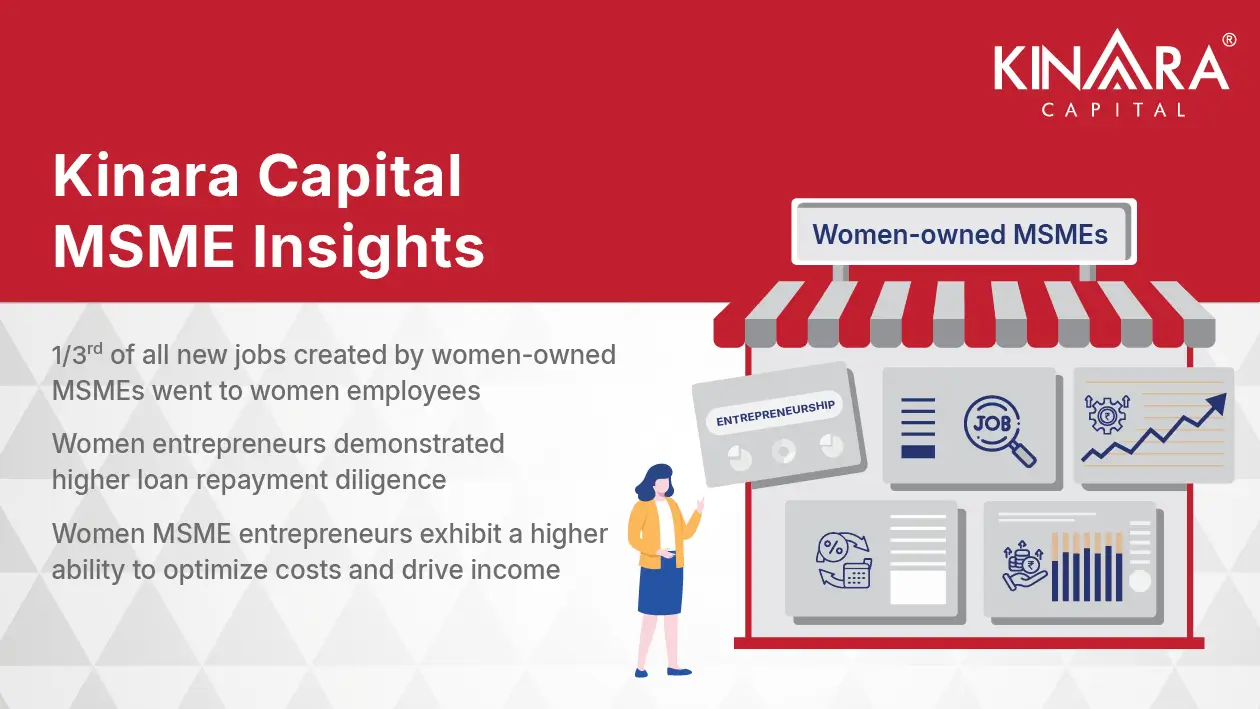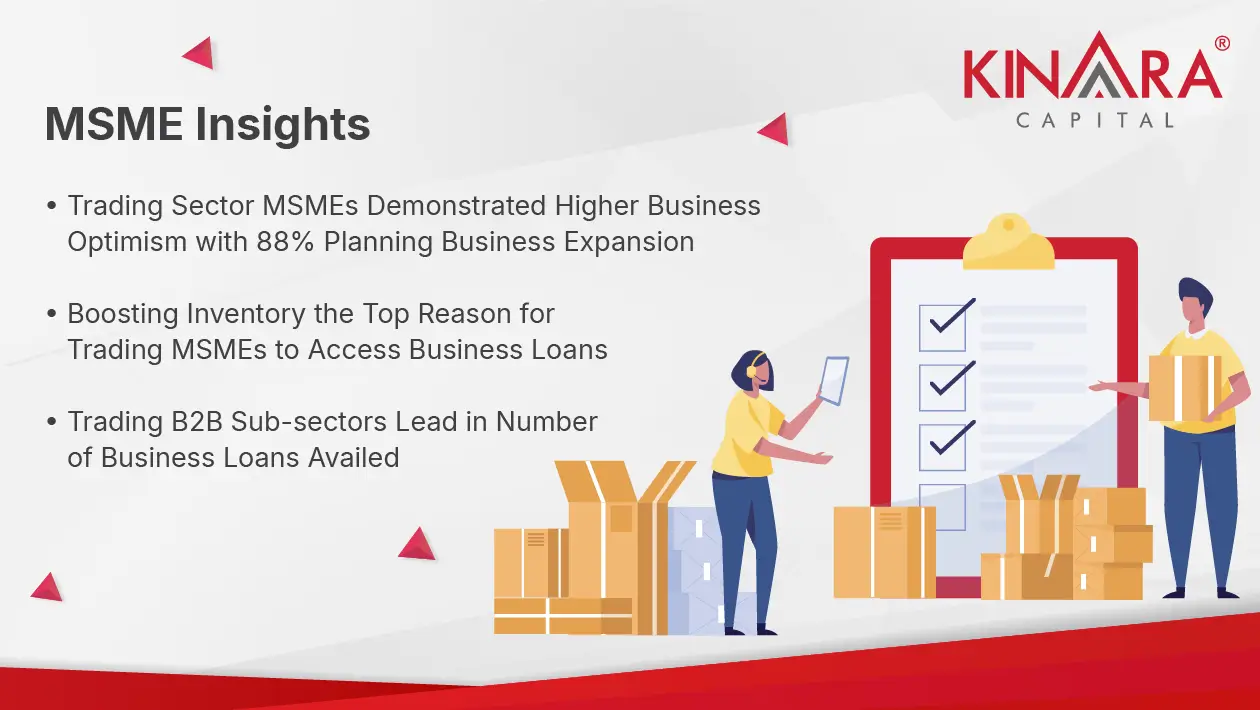Kinara Capital MSME Insights Data Analysis Reveals That Financial Inclusion Of Women-Owned MSMEs Creates More Jobs For Women

● Women-owned MSMEs Generated 11% more Jobs for Women than Men-owned MSMEs
● 1/3rd of all New Jobs Created by Women-owned MSMEs Hire Women Employees Locally
● Women-owned MSMEs Demonstrate Higher Repayment compared to Male-owned MSMEs
Bengaluru, March 1, 2024: Kinara Capital, a fast-growing fintech driving vast financial inclusion of the MSME sector, today released MSME Insights, a detailed data analysis of women-owned MSMEs. According to MSME Insights, women-owned MSMEs hired 11% more women employees than male-owned MSMEs. The analysis further revealed that 1/3rd of all new jobs created by women-owned MSMEs went to women employees, thus boosting local economies.
Hardika Shah, Founder & CEO, Kinara Capital said, “Our MSME Insights data is concrete evidence that financial inclusion of women entrepreneurs is a critical step towards reaching Gender Parity. Women entrepreneurs demonstrated better repayment of their business loans, created more jobs for other women, and experienced an income increase for themselves. Access to credit is the first step towards financial independence and we expect this data will inspire more to adopt a gender lens approach to driving financial inclusion and introduce specific women-focused products and services.”
MSME Insights Key Data Findings on Women-owned MSMEs
● 1/3rd of all jobs created by women-owned MSMEs go to women: Fostering greater participation of women in economic activity is often cited as an effective tool to bring about sustainable growth. The MSME Insights findings echo this conjecture. As per the analysis, women employees constituted over 32.4% of all jobs created by women-owned MSMEs.
Outperforming male-owned MSMEs by 11%, women entrepreneurs contributed to increased female employment and economic development in their local communities. Women entrepreneurs across all three MSME sectors of Manufacturing, Trading, and Services, exhibited a higher degree of acceptance as women-owned MSMEs are evidently more receptive to women employees than their male counterparts. The Services MSME sector contributed the highest number of jobs at 36%, followed by the Manufacturing MSME sector at 34% and the Trading MSME sector at 28%.
● Women MSME entrepreneurs exhibit a higher ability to optimize costs and drive income: When supported with resources, particularly formal credit, women-owned MSMEs showcased a 12% rise in their organization’s monthly revenue. What stood out even more was their ability to drive income growth. Women-owned MSMEs registered a 19% increase in monthly net income, compared to 18% by men-owned MSMEs, indicating better utilization of resources and control over costs.
● Financial inclusion of women entrepreneurs led to a 12% rise in their salary: The impact of driving financial inclusion of women is not restricted to boosting their ability to improve their organizational income; it has an equal impact on the proprietor’s salary. Women entrepreneurs witnessed a 12% rise in their salaries. In fact, women entrepreneurs experienced a 4% higher rise in their salaries than male entrepreneurs. Improvement, especially in women’s incomes, is often considered conducive to the betterment of communities. According to the United Nations, women spend nearly 90% of their earned income on their families’ well-being, thereby improving access to better nutrition, healthcare, and education.
● Women entrepreneurs demonstrated higher loan repayment diligence: One of the key aspects that dictate the openness of formal lenders to extend credit is the repayment trend. According to the analysis, while only 3.4% of the women entrepreneurs defaulted on loan repayment, the rate among men was as high as 4.6%. This behavioral pattern was consistent across all states. From the sectoral perspective, women entrepreneurs presented a positive trend in both manufacturing and trading; however, the service sector witnessed a reverse trend.
● By leading in 3 out of the 6 parameters, the Manufacturing MSME sector takes the lead in highlighting women’s prowess: From a sector perspective, women entrepreneurs in the manufacturing sector seem to be outperforming their counterparts by the greatest margin and setting the stage for greater acceptance for women-owned businesses. Out of the new jobs created in the manufacturing sector, 63% were by women-owned MSMEs and only 58% were by men-owned businesses. Further, with a risk portfolio percentage as low as 2.6%, women entrepreneurs performed better than men in terms of repayment. The repayment risk of male entrepreneurs was as high as 4.6%. From a proprietor salary perspective, women exhibited a 16% rise, 11% higher than men. In fact, women entrepreneurs in the manufacturing sector took the lead compared to other sectors as well, making them the leader in bringing the spotlight on women entrepreneurs.
● With 96% of MSME women entrepreneurs seeking working Capital, it has emerged as the leading business loan purpose: When it comes to loan purposes both women-owned MSMEs and businesses owned by men indicated a similar trend. For both men and women owned Working Capital with 96% of entrepreneurs stood as the prime purpose of credit. The other reasons were Property Improvement with 2% Business Development and Others with 1% each.
The MSME Insights dwells deep into the women MSME landscape, their performance, and their socio-economic impact with analyzed data from 44,821 MSMEs across 6 states: Andhra Pradesh, Gujarat, Karnataka, Maharashtra, Tamil Nadu, and Telangana, and the Union Territory of Puducherry.
About Kinara Capital
Kinara Capital is a fast-growing fintech company and is globally recognized for disrupting the small business lending model in India by democratising access to collateral-free business credit in India. Kinara Capital has disbursed over INR 6,200+ crores to date across 1,00,000+ collateral-free business loans thereby propelling vast financial inclusion of India’s MSME sector. Leading with a women- majority management team, Kinara Capital has raised the bar for gender inclusivity internally as an organisation and externally with its HerVikas program for women entrepreneurs. The company is qualified as a Systemically Important NBFC by the Reserve Bank of India (RBI) and is a debt-listed entity on the Bombay Stock Exchange (BSE). Founded in 2011, and headquartered in Bengaluru, Kinara Capital has 133 branches serving MSMEs across 100+ cities in India with a workforce of 2,000+ employees. Visit kinaracapital.com for more information and follow us on Twitter @KinaraCapital.
You may also like

Kinara Capital, a fast-growing fintech driving financial inclusion of the micro-small-medium enterprise (MSME) sector, today released its 3rd edition of MSME Insights, a detailed data analysis highlighting sector trends. According to MSME Insights, immediate plans for business expansion is the primary reason for MSMEs to seek access to formal credit.
Read MoreKinara Capital is a registered brand of Kinara Capital Private Limited
(formerly known as Visage Holdings and Finance Private Limited)
Get in touch
- [email protected]Email
- 1800 103 2683Toll Free
Monday - Friday | 9.30AM - 6.00PM
Company Information
- Fair Practices Code
- Vigil Mechanism (Whistleblower) Policy
- Customer Grievance Redressal Policy
- Corporate Social Responsibility (CSR) Policy
- E-Waste Management Policy
- Terms of Use
- Terms & Conditions
- Privacy Policy
- Internal Guidelines on Corporate Governance
- Related Party Transactions Policy
- Interest Rate and Charges Policy
- Policy on Appointment of Statutory Auditors
- Exclusion List
- Prevention of Sexual Harassment (PoSH) Policy
- Co-lending Policy
- Policy for Preservation of Documents and Archival of Documents
- Code of Practices for Fair Disclosure of Unpublished Price Sensitive Information
- Terms and Conditions of Appointment of Independent Directors
- Process for Return of Original Documents to Legal Heirs of Deceased Mortgagor
- Environmental, Social, Governance(ESG) Policy
- Nomination and Remuneration Policy
- Classification of Special Mention Account and Non-Performing Asset
- Moratorium Policy
- Ombudsman Scheme
- RBI Integrated Ombudsman Scheme
- Policy for Claiming Unclaimed Interest or Principal Amount on Non-Convertible Securities from Escrow Account


